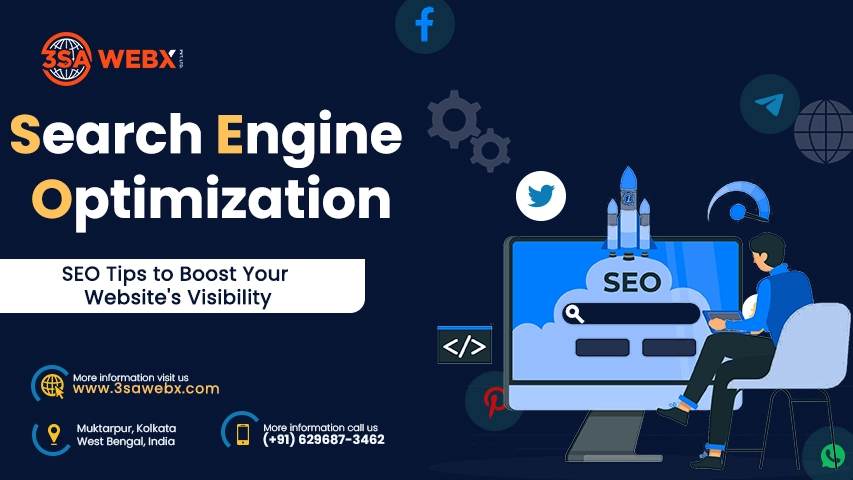TOP 10 SEO TIPS TO BOOST YOUR WEBSITE VISIBILITY
By Sankar Goswami

Introduction:
In today's highly competitive digital landscape, having a solid SEO strategy is crucial for any business aiming to succeed online. Search Engine Optimization (SEO) helps improve your website's visibility in search engine results, drive organic traffic, and increase your chances of reaching your target audience. In this article, we will explore the top 10 SEO tips that can significantly enhance your website's ranking and overall online presence. Let's dive in!
Conduct Keyword Research:
Keywords are the foundation of SEO. Start by identifying relevant keywords and phrases that align with your business niche. Use tools like Google Keyword Planner or SEMrush to discover high-ranking keywords with reasonable search volumes. Incorporate these keywords strategically into your website's content, meta tags, headings, and URLs to boost your visibility in search results.
Optimize On-Page Elements:
Ensure your website's on-page elements are optimized for search engines. This includes optimizing meta tags (title tags and meta descriptions), headers, image alt text, and URL structure. By optimizing these elements with your target keywords, search engines can better understand the relevance and content of your webpages.
Create Engaging and Valuable Content:
Content is king in the digital world. Produce high-quality, informative, and engaging content that resonates with your target audience. Incorporate relevant keywords naturally within your content to improve its visibility for specific search queries. Additionally, consider creating long-form content, such as comprehensive guides or tutorials, to establish yourself as an authority in your industry.
Ensure Mobile Responsiveness:
With the increasing use of mobile devices, having a mobile-friendly website is crucial for SEO. Optimize your website's design and layout to ensure it provides a seamless user experience across various devices. Google's mobile-first indexing prioritizes mobile-friendly websites, so optimizing for mobile responsiveness is essential for higher rankings.
Improve Website Speed:
Page loading speed directly impacts user experience and search engine rankings. Optimize your website's loading speed by compressing images, minifying CSS and JavaScript files, and leveraging browser caching. A faster website not only enhances user satisfaction but also improves your chances of ranking higher in search results.
Build High-Quality Backlinks:
Backlinks play a significant role in SEO. Focus on acquiring high-quality backlinks from reputable websites within your industry. Engage in guest blogging, participate in industry forums, and collaborate with influencers to build a strong backlink profile. Quality backlinks signal to search engines that your website is a reliable source of information.
Leverage Social Media:
Social media platforms are not directly tied to search engine rankings, but they can indirectly impact your SEO efforts. Share your content on social media channels to increase its visibility and attract potential backlinks. Engaging with your audience on social media also helps build brand awareness and drive organic traffic to your website.
Monitor and Analyze Performance:
Regularly monitor your website's performance using tools like Google Analytics and Google Search Console. Analyze important metrics such as organic traffic, bounce rate, and keyword rankings. By closely tracking these metrics, you can identify areas for improvement and adjust your SEO strategy accordingly.
Optimize for Local SEO:
If your business has a physical location, optimizing for local SEO is vital. Create a Google My Business listing and ensure your business information is accurate and up to date. Encourage customers to leave reviews and ratings, as positive reviews can significantly improve your local search visibility.
Stay Updated with SEO Trends:
SEO is a dynamic field, with algorithms and best practices constantly evolving. Stay updated with the latest SEO trends, algorithm changes, and industry updates. Follow reputable SEO blogs, attend webinars, and join online communities to stay ahead of the game and ensure that your SEO strategies align with current best practices.
Conclusion:
Implementing these top 10 SEO tips can have a profound impact on your website's visibility and search engine rankings. By conducting thorough keyword research, optimizing on-page elements, creating valuable content, and focusing on mobile responsiveness, you lay a solid foundation for SEO success. Additionally, building high-quality backlinks, leveraging social media, monitoring performance, optimizing for local SEO, and staying updated with industry trends are essential for long-term SEO growth.
Remember, SEO is an ongoing process that requires dedication, consistent effort, and adaptation to changes. By following these tips and continuously refining your strategy, you can enhance your website's visibility, attract organic traffic, and ultimately achieve your digital marketing goals.
